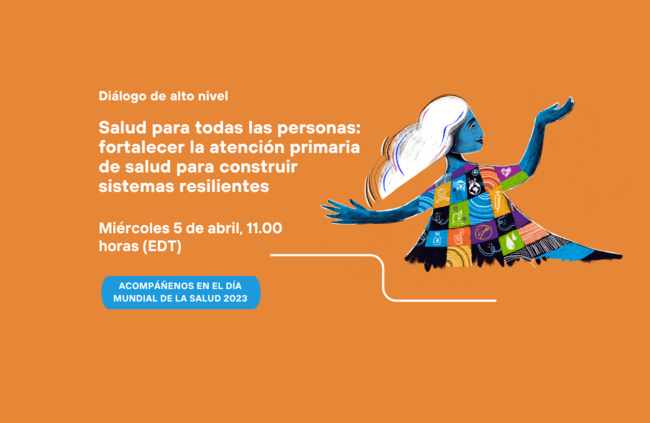High level dialogue. Health for all: strengthening primary health care to build resilient systems. Wednesday, April 5th, 11:00 AM (EST) – Live on PAHO TV. Languages: Spanish, French, English, Portuguese and International Sign Language.
background
On April 7, 2023, the World Health Organization will celebrate its 75th anniversary and will associate this celebration with World Health Day 2023. In this context, the Pan American Health Organization (PAHO) invites you to participate in the high-level dialogue meeting entitled Health for All: Strengthening Primary Health Care to Build Systems Flexible. The activity, which will be implemented virtually on Wednesday, April 5, 2023, aims to promote reflection on public health achievements that have improved the quality of life in recent decades; Promoting lessons learned, particularly those that emerged in the context of the COVID-19 pandemic; And stimulating action to meet health challenges in the present and the future.
Salud para todas las personas, in the context of the Americas region, is a call to defend the right to health, as a fundamental human right. It is also a call to reaffirm commitment to primary health care (PHC) as the cornerstone of sustainable and resilient health systems that move towards universal coverage and universal access to health (holistic health), as well as towards compliance with the Sustainable Development Goals (SDGs) (1-3). The primary health care approach has been and remains a central component of initiatives to strengthen and transform health systems, promoting the participation of all levels of government and society, and bringing together three components: multisectoral policies and measures; action capacity and decision of people and communities; and integrated health services that focus on primary care and regenerative essential public health functions (FESP).
Social empowerment has been a key component of the Region’s response to the COVID-19 pandemic and its consequences. Numerous examples of good practice have emerged from the work of organizations and groups at the local and regional levels in each country of the region. This demonstrates the transformative potential of engaging and empowering individuals, families, and communities to increase social engagement and improve self-care for health. It also calls on decision-makers to continue to ensure informed and effective participation in which people are at the center of health decisions and outcomes.
Health for All has roots in our region, community and region. Both pro-right to health social and political leadership, as well as initiatives to strengthen health systems from a primary health care approach, must adopt a strong perspective and territorial ownership. Integrated health service networks (RISS), as one of the main operational expressions of the primary health care approach, can also take forms that allow for increased resilience and contribute to the achievement of holistic health (4).
The celebration of International Women’s Day is a celebration of citizenship and the global community. An opportunity to reaffirm the region’s commitment to the right of everyone to enjoy the highest attainable standard of physical and mental health. In this sense, this activity is aimed at a general audience, presenting a group of high-level speakers representing different points of view: health ministers and government authorities, actors in the international system, representatives of community organizations and civil society. We hope that the dialogue will enhance the energies and motivations of the participants to participate and involve their communities in health care and social participation in health; and that it contributes to the reflections and attitudes of those who bear responsibility for making decisions that lead to the strengthening of health systems.
note
- Pan American Health Organization. A strategy for universal access to health and universal health coverage. Fifty-third Pan American Health Organization Steering Council, Sixty-sixth Session of the WHO Regional Committee for the Americas. (resolution CD53/5.R2) [Internet]. Washington, D.C.: Pan American Health Organization; 2014. Available at: https://www.paho.org/hq/dmdocuments/2014/CD53-5-s.pdf
- Pan American Health Organization. 30-30-30 APS Accord on Holistic Health [Internet]. Washington, D.C.; 2019 [consultado 2021 Sep 7]. Available in: https://www3.paho.org/hq/index.php?option=com_docman&view=download&alia…
- Pan American Health Organization. A strategy for building resilient health systems and recovering post-COVID-19 to preserve and protect public health gains. Fifty-ninth Pan American Health Organization Steering Council, Seventy-third Session of the WHO Regional Committee for the Americas (CD59/11) [Internet]. Washington, D.C.; 2021 Available at: https://iris.paho.org/bitstream/handle/10665.2/55859/OPSHSSHSCOVID-1921…
- Pan American Health Organization. An integrated care policy for improving health outcomes. Thirtieth Pan American Health Conference, Seventy-fourth Session of the WHO Regional Committee for the Americas. (Document CSP30/10). 2022 [consultado 2022 Oct 17]; Available at: https://www.paho.org/sites/default/files/csp30-10-s-politica-atencion-i…

“Beeraholic. Friend of animals everywhere. Evil web scholar. Zombie maven.”

:quality(85)/cloudfront-us-east-1.images.arcpublishing.com/infobae/AL6JURSLDRFCBZDTHQZECTZVDM.jpg)
:quality(85)/cloudfront-us-east-1.images.arcpublishing.com/infobae/GXZYEJ3EHZCJRLVACL3MM753OI.jpg)
:quality(85)/cloudfront-us-east-1.images.arcpublishing.com/infobae/P4FWF242JFA4BDV33F5JKOUUX4.jpg)



More Stories
Scientists revive old cell phone batteries using a chemical method
Daniel Gomez Rinaldi recounted his moment of poor health: “It was the strongest pain I have ever felt in my life.”
What are quantum computers and why are they the most expensive technology in the world?